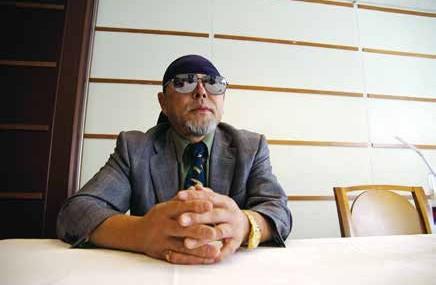Issue:
HOTDOGGING OR TRUTH-TELLING? THIS FORMER SUSHI CHEF TO THE HERMIT KINGDOM RULERS MAY BE DOING A BIT OF BOTH

Did the Japanese government purposely sever a key diplomatic “pipeline” with North Korea’s long ruling Kim family? Or is Kenji Fujimoto’s claim in his newest memoir about the Kim regime just a fishy tale reeking with personal propaganda? In Hikisakareta Yakusoku (“The Promise Torn Apart”), the sushi chef to former leader Kim Jong Il blames former Prime Minister Noda for “tearing asunder” his friendship with current leader Kim Jong-Un and destroying potential insights he could offer, including help in finding Japanese abductees.
“When I left North Korea in August, I promised Kim Jong-Un that I would return on Sept. 1,” said Fujimoto, during his recent press conference at the FCCJ. After considerable “begging” from Jin Matsubara, the state minister then in charge of the abduction issue, Fujimoto agreed to delay his trip for one week until Noda could prepare a formal letter to present to the North Korean leader. The letter, however, was never written. When Fujimoto went to Beijing on Sept. 7, on his way to North Korea with no letter in hand his visa to the North was denied. “It’s because I broke my promise to [Kim Jong-Un],” he said. “People must be saying, ‘It’s as we predicted. Fujimoto is a liar.’”
Matsubara, in the meantime, wrote a rebuttal on his website saying that he did meet secretly with Fujimoto, but that it is not a “fact that I asked him to postpone his revisit to North Korea, and there was no option under any circumstances whatsoever of entrusting a public document to him.”
Government conspiracy, backroom bungling or a self appointed go between out of sync for Fujimoto the rejection is a major blow. Is it a blow for Japan? May be so. With the new Abe administration’s hawkish stance on North Korea’s “ballistic missile” program, the abduction issue and islands disputes, we may be seeing an atrophy of diplomatic channels. An unofficial spokesman like Fujimoto could be the best alternative, despite his eccentricities and high praise for North Korea. Simply put, he may be better than nothing.
In fact, Fujimoto’s access to the regime’s highest figures has scored him major attention for accuracy. He rightly predicted the choice of Kim Jong Un as supreme leader, following in his father’s footsteps though many thought he was too young for the job. At the FCCJ, Fujimoto revealed that Kim Jong Un turned 30 years old this Jan. 8, confirming that he is indeed the young est living leader of a nation.
Fujimoto also rightly predicted North Korea’s rocket launch in December. Interestingly, he indicated that Kim Jong Un is not necessarily enthusiastic about the country’s rocket program. “It’s not a matter of whether he is in favor or against it. He is trying to keep dialogue with the military leaders.” He said Kim Jong Un believes the launch is a way to pay respect to his father, who died the year before on Dec. 17.
Revelations about Kim Sr.’s lavish life style are also credited to Fujimoto. His first 2003 tell all book, I was Kim Jong Il’s Cook a bestseller in Japan details the debauchery and exotic tastes of the reclusive leader during his 13 years as sushi chef from 1988 to 2001. He writes about the family’s luxurious villas, imported cars, lavish banquets and pleasure parties where guests were told to dance with, but not touch, the troupe of female strippers dubbed, “Kim’s Joy Division.”
The former chef also tells of his all expenses paid worldwide travels in search of Kim’s favorite foods, with little reference to the country’s abject poverty and rampant starvation. Neither does the younger Kim, Fujimoto explained, question his own lavish lifestyle. “Like every country in the world, there are poor people and wealthy people who eat well. . . . There is no exception.”
Can Kim Jong Un become an exception in the repressive Kim dynasty? Fujimoto first met Kim junior when he was a boy of seven, and at their reunion last summer he was impressed with how the young leader had matured. “I believe this young man has the ability to change North Korea little by little,” said Fujimoto, adding that he has great will and wants to tackle the country’s mountain of challenges. In the capital of Pyongyang, he said, people seemed happier. “Before people were looking down. . . . Now they’re looking up or at least looking forward.”
Fujimoto’s July to August trip to North Korea was his first since he fled the country in 2001 following rumors that he might be killed. His recount of his reunion with Kim Jong Un could rival a B-grade Hollywood script: “I ran into his arms and shouted ‘Comrade!’ I wanted to hug him forever. Then I said, ‘Fujimoto the betrayer has returned at last. Please forgive me’ . . . I was weeping a waterfall of tears.”
With the invitation from Kim Jong-Un came exoneration, and presumably protection from wayward assassins. But now that he’s banned from returning to the Hermit Kingdom, his future is far from free of fear. He continues to use his Fujimoto pseudonym, and at media events the 65 year old still disguises himself with mirrored sunglasses and a bandanna. Even worse, the media sensation may soon be facing unwanted anonymity as his tales turn old. He may have to reconsider his interview fees, at last count ¥50,000 for radio and ¥100,000 for TV. He may even have to help the abductee families . . . for free.
Lucy Birmingham is a long-time, Tokyo-based journalist, scriptwriter and editor. She writes regularly for TIME and her articles have appeared in, among others, the Wall Street Journal, Newsweek, Bloomberg News and Architectural Digest.

